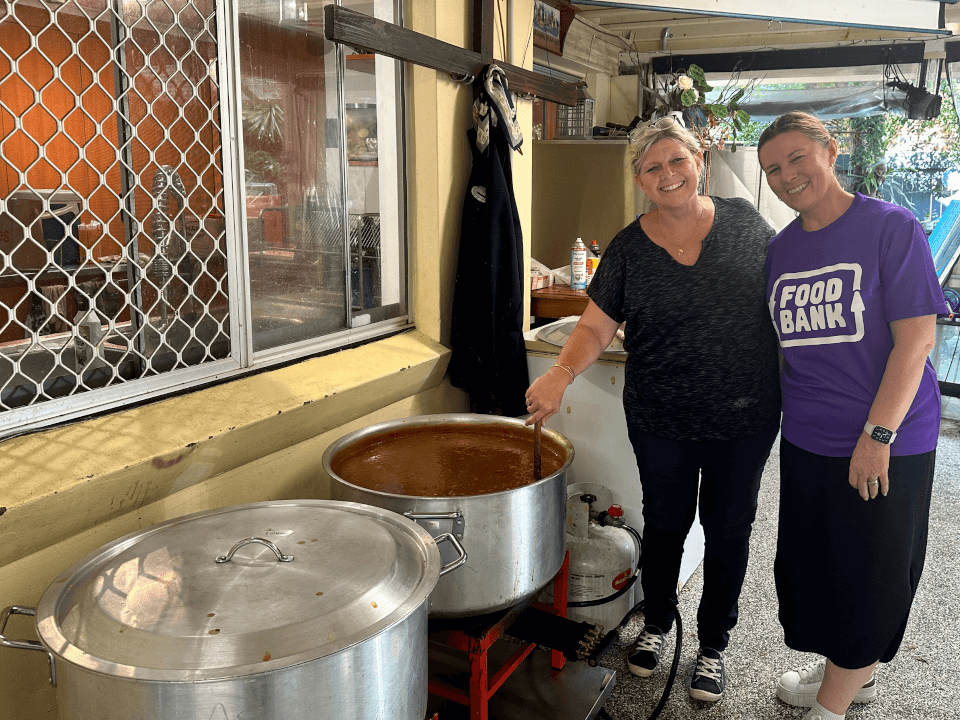Community Partner Story – Fishers of Men
In the heart of Rochdale in Brisbane lies a vibrant home with fish painted on the walls; within it, an extraordinary organisation works tirelessly to change lives and offer hope to those in need. Fishers of Men, driven by faith, love and compassion, has been a beacon of light for the homeless and vulnerable, serving meals and providing rehabilitation services to those seeking a fresh start. Every corner of this humble home radiates care, from the welcoming smiles of the team to the thoughtfully prepared meals. Founding Director Branwen reflects on the power of their work, “sometimes they say the meal they get from us is the best meal they get all week.” They offer more than a nourishing meal. For those who pass through their doors or meet their outreach team on the streets, these meals are an entry point to something far greater; a new chapter, a fresh start, and a chance to rebuild.

Image: Branwen, founding director of Fishers of Men with Katherine from Foodbank Queensland stirring 2 large pots ready for Wednesday night outreach to Brisbane City and Logan.
Every Wednesday and Sunday night, Fishers of Men takes to the streets of Brisbane and Logan, serving 500 meals to those in need. What started as a small operation pre-Covid, serving 60 meals on a Sunday and 40 meals midweek, has expanded exponentially. “When Covid hit, we couldn’t bring people here for food anymore,” Branwen recalls. “We started taking it to the streets. It grew to 100, then 200, and then 300 meals.”
Each meal marks the beginning of a potential transformation. “The meal is just the start. It’s the ‘hey, do you want help?’ And then if they want help, we’ve got houses that we can move them into.”
Fishers of Men isn’t just about feeding people. They offer housing and a structured six-month rehabilitation program to those ready to reset. During this time, they connect with their peers and their faith while cooking meals for their community. After completing the initial program, they transition to a second stage where they regain and rebuild their independence.
“For those who go from here successfully, they become world changers,” says Branwen. “It changes them, and it also changes the world around them – the influence they have.” This transformative process is full circle; individuals who complete the program often return to mentor and support others, becoming an integral part of the Fishers of Men community.
Healthy and nutritious meals wouldn’t be possible without partnerships and community support. Foodbank Queensland plays a curial role, supplying essential items like protein, sauces and food parcels. Branwen shared her appreciation, “We really appreciate the chicken, we used to spend so much money on chicken and protein.” A new food-safe truck, funded through grants, has further enhanced their operation, allowing them to cook and transport meals more efficiently.
Fishers of Men embodies a beautiful cycle of giving. From cooking meals to running car washes on Saturdays to raise funds, the organisation creates opportunities for those in recovery to give back. They even help participants with payment of fines and financial management, ensuring they leave the program with a lighter financial burden and a clearer path forward.
Volunteers are the lifeblood of Fishers of Men. Long-time supporters like Peter and Karn who pick up produce from Foodbank Queensland, have been with the organisation for over 20 years, keeping their mission alive. But more hands are always needed. “We need volunteers to go out on the street and give out meals and also support the men in housing as they recover,” Branwen says. They also call for professional services such as social workers, nurses, counselors and chaplains, to provide the specalised care that many participants need.
The Fishers of Men story is one of faith, determination and community. With the support of Foodbank Queensland, countless volunteers and other donors, they are not only feeding hungry Queenslanders but changing lives. As Branwen puts it. “For those who come through the program, it’s not just about their recovery – they get the help they need and then they are helping others.”
 Contact us
Contact us Log in
Log in